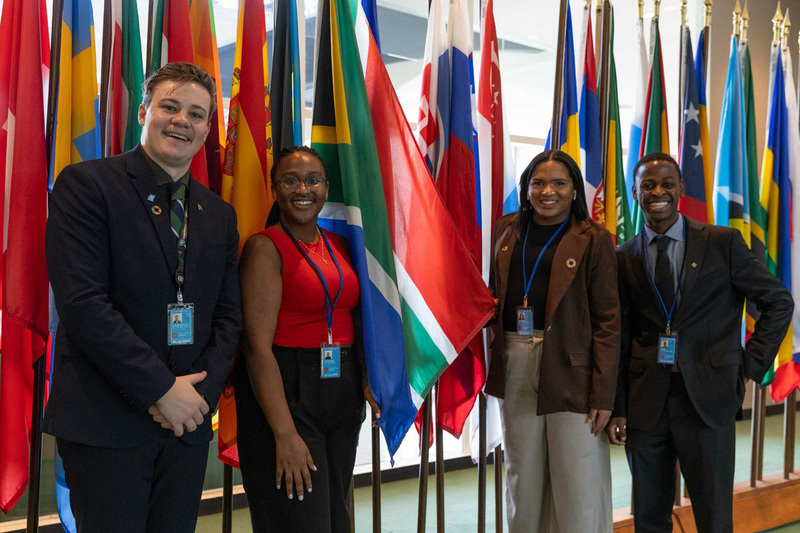UCT students attend high-level UN SDG engagement
30 July 2025 | Story Staff writer. Photos Supplied. Read time 3 min.
Four University of Cape Town (UCT) students represented South Africa at the 2025 United Nations (UN) High-Level Political Forum on Sustainable Development (HLPF) earlier in July.
Nico Pampier, Seabelo Mnisi, Zou Rwexwana and Ben Gukelberger were at the UN headquarters in New York taking part in the forum which focused on advancing sustainable, inclusive, science- and evidence-based solutions for the 2030 Agenda and its Sustainable Development Goals (SDGs). Their participation marked the first time in several years that a youth delegation formed part of South Africa’s official representation at the forum. They took part through the United Nations Association of South Africa-UCT Chapter (UNASA-UCT).
Mnisi, the SDG education director, said: “The space for multilateral exchange was eye-opening; witnessing firsthand how different countries are tackling development hurdles, deploying innovative strategies and mobilising resources to advance the 2030 Agenda.”
“Global perspectives have sharpened my understanding of international governance and policymaking, while also helping me reflect on how such frameworks can be adapted to serve South Africa’s development goals.”
The HLPF brings together ministers, global policymakers, academics and civil society to track global progress on the SDGs. This year’s forum included in-depth reviews of five key goals:
- SDG 3: Good health and well-being
- SDG 5: Gender equality
- SDG 8: Decent work and economic growth
- SDG 14: Life below water
- SDG 17: Partnerships for the goals.
More than 250 young delegates from around the world attended the forum, highlighting the growing recognition of youth voices in global development. The UCT delegation’s participation was supported by the university’s Department of Student Affairs’ (DSA) student travel fund, which helped fund three of the four students. The fund directly addresses the long-standing barrier of access for South African youth to international multilateral spaces.
“We need to learn from the positives and the challenges, and when we go back to our countries, we must take bold actions.”
“Agenda 2030 and Agenda 2063 are a roadmap for African countries to take robust action and to see young people as catalysts for change. This cannot just be a stocktaking experience. We need to learn from the positives and the challenges, and when we go back to our countries, we must take bold actions,” said executive chair, Pampier.
The students return with plans to translate their experience into local impact. These include student-led outreach, policy engagement and awareness campaigns aimed at strengthening youth participation in development conversations on campus and in their communities. They also underscored the role of universities in supporting national development through research, data and evidence-based solutions.
 This work is licensed under a Creative Commons Attribution-NoDerivatives 4.0 International License.
This work is licensed under a Creative Commons Attribution-NoDerivatives 4.0 International License.
Please view the republishing articles page for more information.










